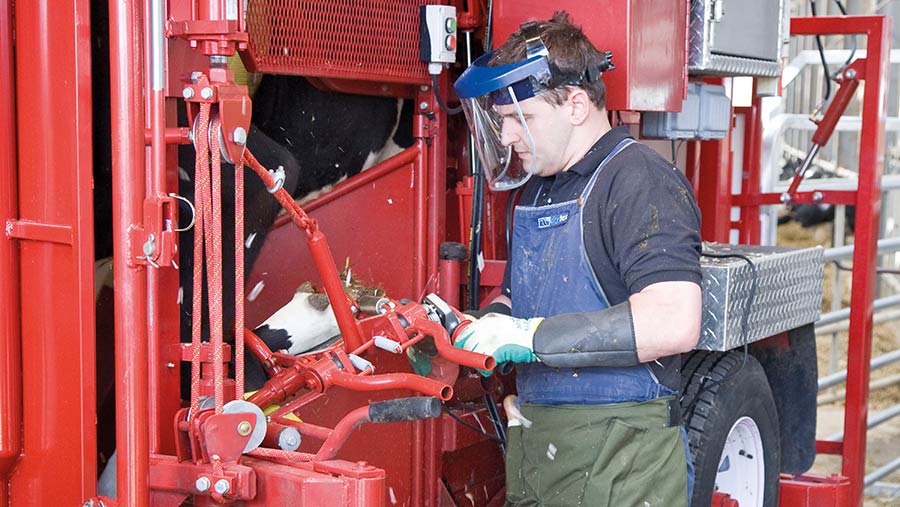7 training and development ideas to retain good dairy staff
 © Tim Scrivener
© Tim Scrivener Training and development are key to holding onto staff and there is a huge number of ways you can show you’re investing in their progression.
If agriculture is to become an attractive career for non-farmers, and farmers wish to become an employer of choice for those in farming already, the industry must offer staff opportunities.
Some workers may be happy to stay where they are, but are you planning for the development of those that are seeking progression?
Be the employer who invests in training and development in all its forms, and you’ll have the best chance of surviving the labour shortage by holding onto your best staff.
Below, people consultant Paul Harris, from Real Success, outlines the various ways you can achieve this.
See also: How to reduce staff working hours on dairy farms
1. On-farm training
Training can be provided by existing staff, your vet, artificial insemination (AI) technicians, or foot-trimming experts.
If the member of staff is livestock-focused, you could get them onto a foot-trimming or AI course, or your vet might run courses on calf-rearing, effective use of drugs, and other practical courses.
When using experienced workers to train newer members of staff, ensure they follow the agreed protocols and have the right personality to train others, because bad habits can quickly get passed on.
2. Off-farm training
AHDB runs numerous courses and has videos and information available on the AHDB website.
If your member of staff is more machinery-focused, help them secure their telehandler licence or attend a tractor driving course. Check out agricultural colleges or the Lantra website for tractor driving courses.
3. Off-farm events
Remember that local discussion groups, along with national events and shows, give staff the opportunity to mix with other farmers and learn from them, as well as hear from established experts.
Allow staff the time off to attend them – they will appreciate the time away from the farm.
The AHDB’s Strategic Dairy Farm initiative gives farmers the chance to visit other farms. This doesn’t always have to be the farm owner – let the staff go in your place.
4. Apprenticeships
These are often discounted by many farmers, but ensure staff are following a registered programme of skills and knowledge development.
See also: How to find and employ apprentices
5. Training agreements and pay awards
Farmers often tell me that they get frustrated when they invest in training and development, and then staff choose to leave their business. But my simple challenge to the farming industry is this: what happens if we don’t invest in training and development for staff and they then stay with us?
We recommend that you put in place a training agreement that allows you to secure some of the investment you’ve made as an employer, should the employee leave within a short period.
You can download a template agreement from the Real Success website to help you do this.
While you may be keen to add a pay award for completion of training, this can create tension within the team – some workers may not be able to grow their careers in the same way.
Covering the cost of the training is often enough to demonstrate your investment in staff. However, promotions received because of training and development, along with time served, can be recognised in rates of pay.
6. Competitive salaries
There is currently upwards pressure on pay – some farmers are concerned that owing to shortage of labour, salaries need to rise.
This is a dangerous road to go down, as margins won’t allow significant increases to most farm staff.
However, staying competitive is important. As a very broad rule of thumb, salaries should track the age of the person up to about 25 years.
Once workers have gained experience, they can start to extend their career and take on more senior positions. This can vary greatly, depending on the size, system and scale of the farm.
There are clearly opportunities for a lucrative career in agriculture on farms, especially if the industry continues to provide accommodation.
Accommodation is worth £500- £1,500/month (depending on where the farm is located), and if this is added to the basic salary, salaries are considerably higher than other industries.
7. Leadership and management skills
While it’s vitally important to invest in technical skills and knowledge, it’s also essential to invest in team leadership, management and communication skills.
To progress within the industry, workers need to be able to communicate effectively with others. AHDB, the Royal Association of British Dairy Farmers (RABDF) and other private organisations (including Real Success) run courses covering communication skills, recruitment and how to lead your team.
As staff develop in their career, the single biggest skill they will need is how to get along with, and inspire, others in their team.
Paul Harris is managing director of Real Success – a people consultancy that helps the agricultural sector to improve staff management. A regular speaker at industry events, Paul is widely recognised as a thought leader and positive advocate of staff development in the agricultural sector.
